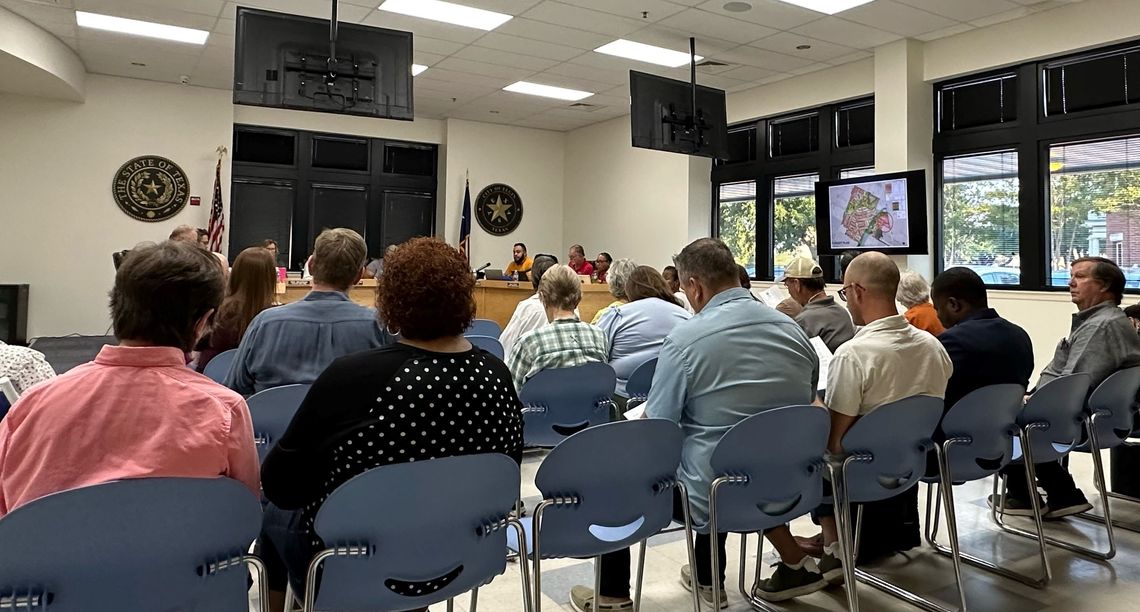A strategic partnership with the Lund Farm Municipal Utility District received its approval during a second public hearing, amidst residents questioning the development company’s validity.
The council meeting saw Elginites fill the seats to express what they consider to be “red flags” surrounding the 570-acre overhaul coming north of the city, with City Manager Thomas Mattis responding that this agreement is the best and only option before the council.
“The city simply doesn’t have the authority to slow down development, that’s literally illegal.”
— City Manager Thomas Mattis
“This public meeting, I’m a little baffled by this, it’s premature and it’s moot,” said John Carlson, who owns and operates a family farm just north of the proposed subdivision.
Speakers worry that Elgin is expanding too fast and that the MUD district will negatively impact city infrastructure, affecting waterline distribution, traffic, EMS, potential future property owners and the school district.
A civilian-proposed estimate suggests that Elgin ISD’s enrollment would increase by 50%, adding an additional 2,500 students when the living spaces are filled.
“There's a parasite of resentment in the community against this project,” said resident Monica Leche.
MUDs are responsible for handling their own police and education connections, responded Mattis. They will either make a contract with the Elgin Police Department or go through the Sheriff, Mattis said. He believes that the school district is on top of its growth.
Aqua Water Supply Corporation is compelled to provide water and assure that water is available for every property owner.
With no website and a lack of public communication, some speakers questioned the company’s legitimacy.
“We just need to slow down and make sure that the company we’re working with is viable, and is somebody that we want to be proud to do a partnership with,” added Jaqueline Smith.
Mattis accredits this to the deal still being new and in the beginning stages of its development.
When the public speakers wrapped, Elgin’s city manager attempted to clear up some of the basic misunderstandings with deals of this kind.
“The city simply doesn’t have the authority to slow down development, that’s literally illegal,” said Mattis. “It’s a violation of the fair housing act for any city to make arbitrary decisions to slow down development.”
He noted that he understands the concern, and that he doesn’t necessarily disagree with it, but the city will continue to grow despite his or any other council member’s opinion.
Entities that own a piece of property outside of city limits have control over what they decide to put on that land.
“We no longer have the authority and ETJs like we used to. That’s a Texas law, it’s not the same in other states, but property rights are obviously the most important thing to the current governor and the legislature,” said Mattis.
The city will incur no cost from these developers, he added, these development agreements put all the burden for every cost associated with the MUD on the MUD.
“This is a system that the legislature, the state law, has put the city in a box about. The council does not have arbitrary authority to decide what development they want to have happen,” he added.
Council members agreed, stating that this agreement is simply about the city being able to collect sales tax from this commercial development, and that not agreeing would have no impact on the developer and just remove a revenue stream from the city.
Without deals like the Lund Farm MUD, the city wouldn’t be able to afford its downtown projects or park growth, they said.
“Development agreements are the only thing the city can do, it’s the best we can do. The harsh reality is, if the housing market stays the way it is, we’ll continue to see more of these projects come forward,” closed Mattis.
.png)








